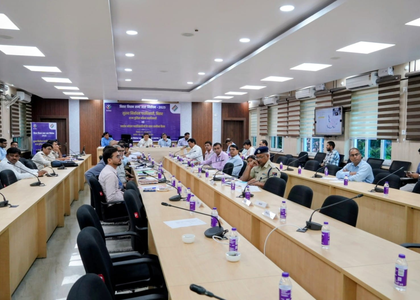Bihar SIR: It’s all about democratic process
By IANS | Updated: October 1, 2025 19:05 IST2025-10-01T19:02:01+5:302025-10-01T19:05:11+5:30
New Delhi, Oct 1 Since the Election Commission of India (ECI) rolled out the Special Intensive Revision (SIR) ...

Bihar SIR: It’s all about democratic process
New Delhi, Oct 1 Since the Election Commission of India (ECI) rolled out the Special Intensive Revision (SIR) of electoral rolls in Bihar, there has been an uproar, with the matter reaching the Supreme Court for arbitration. The poll body continued to conduct the process as laid out in the rule books, facing all aspersions, and on Tuesday, September 30, made public copies of the Bihar electoral roll.
Throughout the process, it kept updating the progress on its website. Even now, if anyone wishes to apply for inclusion of a name in the list, one can submit an application up to 10 days before the last date for filing nominations for elections.
The Bihar Assembly election schedule is expected to be announced by the end of next week. The ECI has also clarified that people not satisfied with any decision regarding an entry in the list may file a first appeal before the District Magistrate and a second appeal before the state’s Chief Electoral Officer, under Section 24 of The Representation of the People Act, 1950.
Yet, critics continue to link the SIR to “vote theft” claims, alleging mass deletions without complying with due process.
This is not the first time that an autonomous constitutional authority like the ECI is under attack. There have been earlier instances of the poll body and the ruling party of the day facing brickbats for alleged collusion.
Charges have even included the so-called misuse of the Electronic Voting Machine (EVM). But this time, it is perhaps the fiercest battle ever witnessed. Since India’s first general election preparations, SIRs have been conducted over a dozen times to cleanse the electoral rolls of ineligible, duplicate, or deceased voters.
Section 21(2) of The Representation of the People Act, 1950, provides that “unless otherwise directed by” the ECI, the electoral roll “be revised in the prescribed manner” before election and bye-election. It also states that this roll “shall be revised in any year in the prescribed manner by reference to the qualifying date if such revision has been directed by the Election Commission…”
And, adds Section 21(3) of the R P Act, the ECI “may at any time, for reasons to be recorded, direct a special revision of the electoral roll for any constituency or part of a constituency in such manner as it may think fit…”
Moreover, ECI’s Manual on Electoral Rolls (March 2023) states, “Special revision of intensive nature was different from ‘intensive revision’ provided in the statutes, as during special revision of intensive nature, enumerators were sent from house to house verification with a working copy containing details of existing electors in a row with a blank row beneath for correction in the existing particulars and also for capturing details of newly eligible persons.
In 2003, intensive revision was conducted in 7 states, while all other states went for special summary revision, and in 2004, special summary revision was undertaken in the entire country.”
Elsewhere, it adds, “Under this type of revision, the Election Commission may adopt changes in the existing procedure, suitable to the specific circumstances.”
Yet, electoral roll revision in Bihar under SIR triggered a chorus of allegations. There were charges, protests, a Parliament logjam, and court petitions, despite the process following the laid-out norms.
Disclaimer: This post has been auto-published from an agency feed without any modifications to the text and has not been reviewed by an editor
Open in app